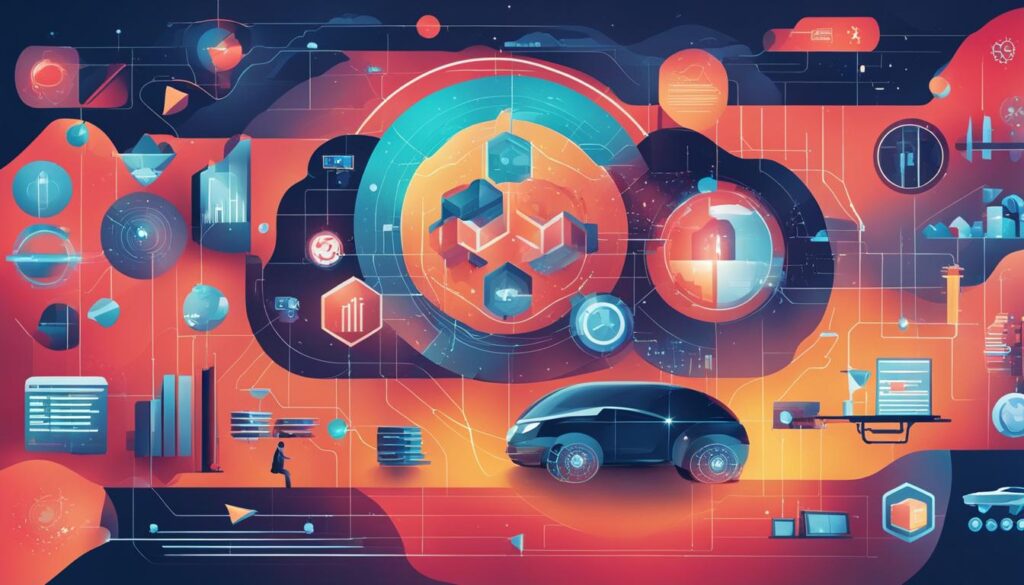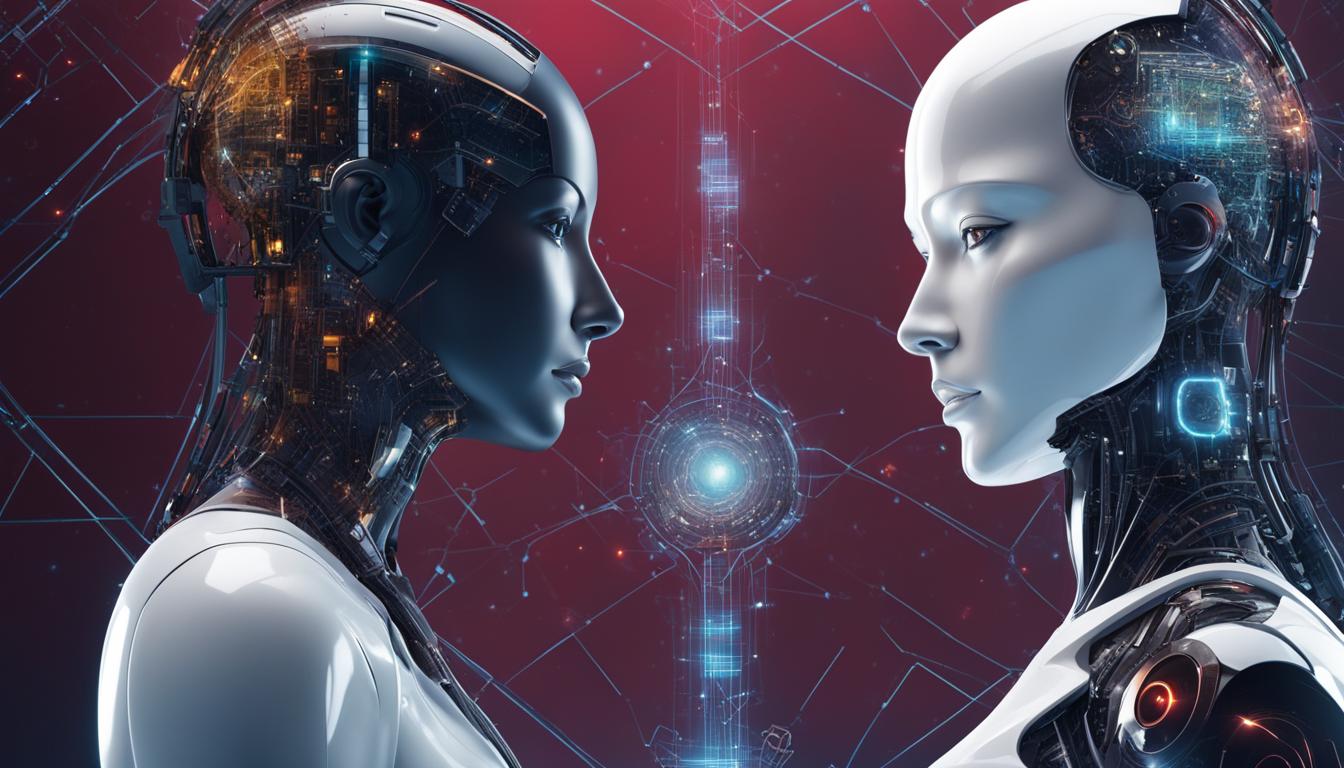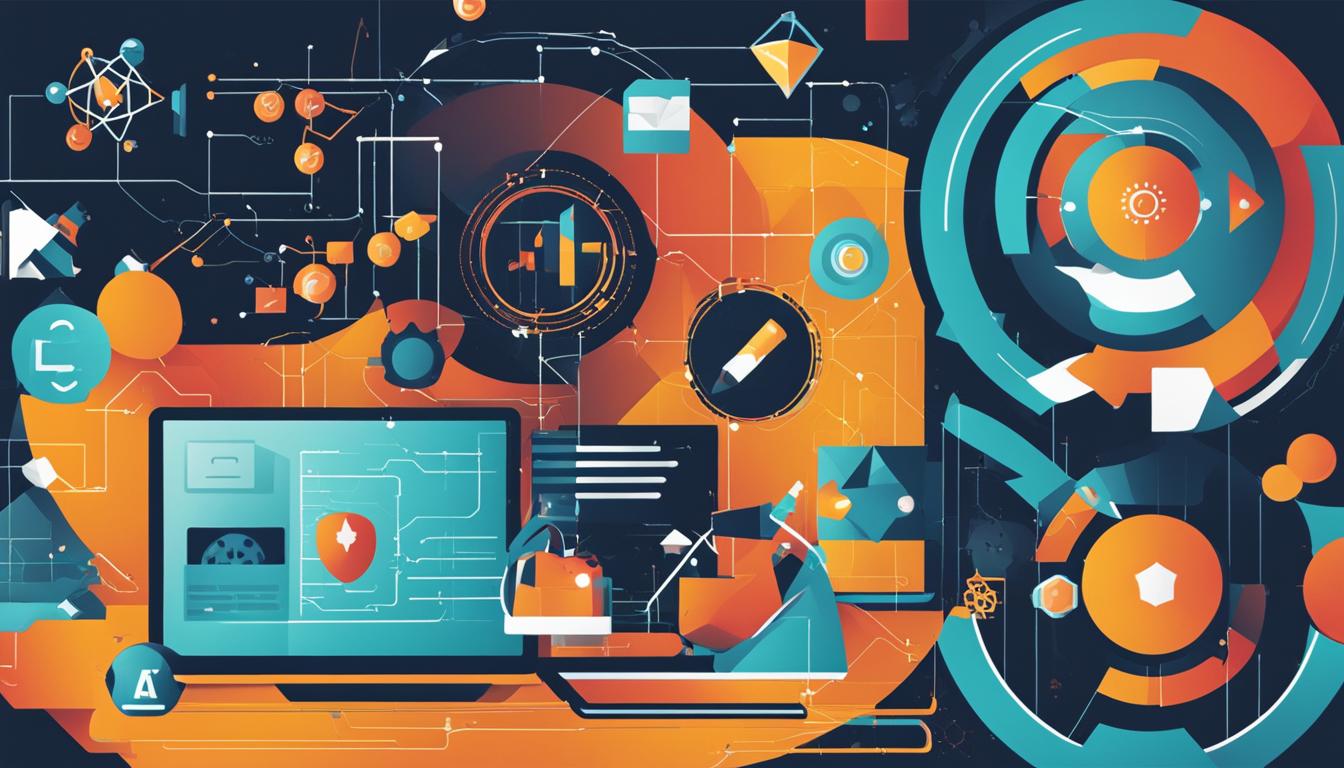As the fields of artificial intelligence (AI) and machine learning (ML) continue to advance, it’s crucial to understand the distinction between these two concepts. While they are often used interchangeably, they have key differences and characteristics that set them apart.
Artificial intelligence refers to the use of technologies that allow machines and computers to mimic cognitive functions associated with human intelligence. This includes tasks such as problem-solving, pattern recognition, and decision-making. On the other hand, machine learning is a subset of AI that focuses on enabling machines to learn and improve from experience without being explicitly programmed.
One way to think about it is that AI is the broader concept, encompassing all aspects of creating intelligent machines, while ML is a specific approach or technique used within AI to achieve learning and self-improvement.
By understanding the key differences and characteristics of AI and ML, we can better appreciate their respective roles in various applications and industries.
Key Takeaways:
- AI and ML are distinct concepts within the broader field of artificial intelligence.
- AI focuses on building machines that mimic human cognitive functions, while ML enables machines to learn and improve from experience.
- AI has a wider scope and can work with all types of data, while ML has a limited scope and can only use structured and semi-structured data.
- Understanding the difference between AI and ML is important for leveraging their respective benefits and applications in various industries.
- The combination of AI and ML brings significant advantages, including improved decision-making, automation, and actionable insights.
Scope and Applications of Artificial Intelligence
Artificial Intelligence (AI) has a wide scope of applications across various industries, offering innovative solutions to complex problems. Let’s explore some of the key applications of AI in different sectors.
AI in Healthcare
In the healthcare industry, AI is revolutionizing patient care and medical research. AI applications include patient health record analysis, which helps doctors make more accurate diagnoses and treatment plans. AI also enables outcome forecasting and modeling, allowing healthcare professionals to predict the effectiveness of different interventions. Furthermore, AI plays a crucial role in drug development, diagnostics, patient monitoring, and extracting valuable information from clinical notes.
AI in Manufacturing
In the manufacturing industry, AI is transforming production processes and improving operational efficiency. AI-powered machine monitoring systems can detect anomalies and optimize production schedules, leading to reduced downtime and increased productivity. Predictive maintenance is another application of AI in manufacturing, where algorithms can predict when machines might fail, enabling proactive maintenance. AI is also utilized in IoT analytics to collect and analyze real-time data from connected devices, allowing manufacturers to optimize their operations and make data-driven decisions.
AI in Banking
The banking industry is harnessing the power of AI to streamline operations, enhance security, and deliver better customer experiences. AI is used for fraud detection, identifying suspicious activities and minimizing financial risks. It also plays a vital role in ensuring cybersecurity by analyzing patterns and detecting potential threats. AI-powered chatbots and virtual assistants automate customer service, providing instant support and personalized interactions. Furthermore, AI technology enables secure authentication methods, such as facial recognition and biometric authentication, improving the overall security of banking transactions.

| Industry | AI Applications |
|---|---|
| Healthcare | Patient health record analysis, outcome forecasting, diagnostics, drug development, patient monitoring |
| Manufacturing | Machine monitoring, predictive maintenance, IoT analytics, operational efficiency |
| Banking | Fraud detection, cybersecurity, customer service automation, authentication |
Understanding Machine Learning
Machine learning is a fundamental component of artificial intelligence that focuses on training algorithms to analyze data, learn from insights, and make informed decisions. It is a process by which computers are programmed to automatically learn and improve from experience without being explicitly programmed. By leveraging machine learning, businesses can unlock valuable insights and predictive capabilities from their data, enabling them to make data-driven decisions and optimize processes.
At its core, machine learning algorithms enable computers to detect patterns and trends in large amounts of data. These algorithms use statistical techniques to identify relationships and dependencies that humans might not be able to discern. By processing vast volumes of data, machine learning algorithms can uncover valuable insights that can be used for various purposes, such as predicting customer behavior, optimizing supply chains, and detecting anomalies or fraud.
There are various types of machine learning algorithms, each designed to address different types of problems. Some common machine learning algorithms include linear regression, decision trees, random forests, support vector machines, and neural networks. These algorithms can be trained on labeled data (supervised learning) or find patterns in unlabeled data (unsupervised learning). Deep learning, a subset of machine learning, utilizes artificial neural networks to model and understand complex patterns, often achieving state-of-the-art performance in tasks such as image recognition and natural language processing.
Benefits of Machine Learning:
- Improved decision-making: Machine learning algorithms can process vast amounts of data and generate accurate predictions and recommendations, aiding in more informed decision-making.
- Automation of repetitive tasks: ML can automate repetitive tasks, freeing up time for employees to focus on more complex and strategic activities.
- Enhanced business performance: By leveraging machine learning, businesses can optimize processes, identify cost-saving opportunities, and drive overall efficiency.
- Personalized customer experiences: ML algorithms can analyze customer data to deliver personalized recommendations, offers, and experiences, improving customer satisfaction and loyalty.
In summary, machine learning is the core technology behind many AI applications. Through its ability to analyze and learn from data, machine learning enables businesses to unlock valuable insights, automate tasks, and make data-driven decisions. By understanding the principles and applications of machine learning, organizations can leverage this powerful technology to gain a competitive advantage and drive innovation.
| Machine Learning Algorithm | Use Case |
|---|---|
| Linear Regression | Predicting sales based on historical data |
| Decision Trees | Classification of customer segments for targeted marketing |
| Random Forests | Detecting credit card fraud based on transaction patterns |
| Support Vector Machines | Text classification for sentiment analysis |
| Neural Networks | Image recognition for self-driving cars |
Benefits and Applications of AI and Machine Learning
Artificial Intelligence (AI) and Machine Learning (ML) offer numerous benefits and have a wide range of applications across industries. By leveraging AI and ML technologies, businesses can unlock new opportunities, enhance data analysis capabilities, improve decision-making processes, and automate tasks. Let’s explore some of the key benefits and applications of AI and ML.
Business Benefits of AI and ML
AI and ML provide several advantages to businesses. They enable organizations to extract valuable insights from large volumes of data, leading to better understanding of customer behaviors, market trends, and business operations. By harnessing the power of AI and ML, businesses can optimize their processes, reduce costs, increase efficiency, and gain a competitive edge in the market.
AI in Data Analysis
One of the key applications of AI and ML is in data analysis. These technologies can process and analyze vast amounts of data at a speed and scale that is beyond human capabilities. By applying advanced algorithms and machine learning models, businesses can uncover patterns, trends, and anomalies in their data, leading to more accurate predictions, actionable insights, and informed decision-making.
AI in Decision-Making
AI and ML can significantly enhance decision-making processes by providing valuable recommendations and predictions. Through the use of algorithms and machine learning models, businesses can automate decision-making tasks, streamline operations, and improve overall efficiency. By relying on AI and ML technologies, organizations can make data-driven decisions, mitigate risks, and optimize outcomes.
AI in Automation
Automation is another area where AI and ML can have a profound impact. These technologies can automate repetitive and time-consuming tasks, freeing up human resources to focus on more strategic and complex activities. By implementing AI-powered automation solutions, businesses can increase productivity, reduce errors, and improve overall operational efficiency.
Overall, the benefits and applications of AI and ML are vast and diverse. Whether it’s in data analysis, decision-making, or automation, these technologies have the potential to revolutionize industries and drive business success in the modern era.

Conclusion
In conclusion, understanding the key differences between Artificial Intelligence (AI) and Machine Learning (ML) is crucial. While AI encompasses the broader concept of enabling machines to replicate human intelligence, ML is a subset of AI that specifically focuses on learning from data to perform specific tasks.
AI and ML have distinct scopes and applications. AI has a wide range of uses and can work with all types of data, while ML has a more limited scope and is primarily used with structured and semi-structured data.
The combination of AI and ML brings significant benefits to organizations across industries. By harnessing the power of these technologies, businesses can automate tasks, improve decision-making processes, and gain valuable insights from their data. From healthcare to manufacturing, retail to finance, AI and ML have numerous applications that can optimize operations and drive growth.
Key Takeaways
1. AI and ML are distinct concepts, with AI referring to machines mirroring human intelligence and ML focusing on learning from data.
2. AI has a wide scope of applications, while ML has a more limited scope and works with structured and semi-structured data.
3. By leveraging AI and ML together, organizations can automate tasks, enhance decision-making, and gain actionable insights from their data.
FAQ
What is the difference between Artificial Intelligence (AI) and Machine Learning (ML)?
AI refers to the use of technologies to build machines and computers that can mimic cognitive functions associated with human intelligence. ML is a subset of AI that focuses on enabling machines or systems to learn and improve from experience.
What are the scope and applications of Artificial Intelligence?
AI has a wide scope of applications across various industries. In healthcare, it is used for patient health record analysis, drug development, diagnostics, and more. In manufacturing, AI is used for machine monitoring, predictive maintenance, and operational efficiency. In banking, it is used for fraud detection, customer service automation, and more.
What is Machine Learning and how does it work?
Machine Learning is a subfield of AI that focuses on training algorithms to analyze data, learn from insights, and make informed decisions. It uses algorithms to improve performance over time as they are trained with more data. Machine learning models are the output of this process.
What are the benefits and applications of AI and Machine Learning?
By combining AI and ML, organizations can analyze a wider range of data sources, improve data processing and decision-making speed, increase operational efficiency, and integrate predictive analytics and insights into their business. AI and ML have applications in healthcare, manufacturing, finance, retail, and telecommunications, among others.
 Skip to main content
Skip to main content


